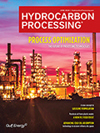March 2024
Trends and Resources
Business Trends: A 2024 and beyond outlook for the GCC chemical industry
The global chemical industry faced a challenging year in 2023. Various factors contributed to sluggish demand growth for chemicals globally, including the European recession, U.S. inflation and a lower-than-expected chemical demand rebound in China. These factors resulted in global chemical market growth of < 1% in 2023, with many producers experiencing lower output.






Comments